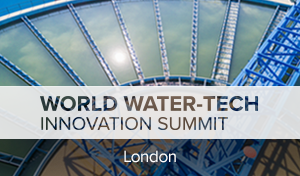Monday, February 24, 2025
Pre-Summit International Reception: Hosted by British Water
British Water will host a pre-summit international reception, a fantastic opportunity to meet up with peers and make new connections with water decision-makers before the summit action begins. Find out more information and registration details here>>
Tuesday February 25, 2025
- In the face of continuous economic shocks, energy crises and extreme weather events, what scenarios and forecasts should be considered for the water supply chain when preparing for the future?
- How are utilities around the world approaching water resource planning, management and innovation to ensure their operations withstand disruptions? What actions are they taking to protect water security and affordability of water supply?
- How can technology support water and wastewater system adaptation, and what are the key priorities for research and investment to enhance resilience?
- How can industry leaders, policymakers and financial institutions collaboratively support and incentivise long-term climate adaptation?
Speaker:
Helen Wakeham, Director for Water Transformation, ENVIRONMENT AGENCY, UK
- As we get closer to the 2030 net zero operational targets for water utilities, what’s needed for the water sector to develop a cohesive and actionable roadmap for measuring and reporting on life-cycle assessment of carbon emissions?
- How are utilities rethinking their CapEx and OpEx strategies to minimise the footprint of their activities to meet Scope 1, 2 and 3 emission targets?
- What solutions are poised to best support the water sector to achieve net zero while maintaining efficiency? How can AI and smart technologies be harnessed to accurately provide emissions data at each stage of water distribution and treatment?
- What is the role of regulation in supporting the transition to net zero for the water industry?
Speakers:
Elise Cartmell, General Manager Zero Emissions, SCOTTISH WATER, UK
James Cooper, Global Director of Water, ARCADIS, USA
- How can the water industry deliver on ambitious plans to deploy green-blue infrastructure to mitigate against flash events in the face of tightening budgets?
- How can the sector prioritise a long-term vision when it comes to asset management and maintenance, while grappling with mid-term investment cycles?
- Where are we seeing successful implementation of nature-based solutions (NbS), such as Sustainable Drainage Systems (SuDS), to enhance the resilience of water systems to extreme weather events? What learnings can be applied to support implementation at scale?
- What multi-agency partnerships between utilities, local authorities and technology providers are needed to ensure infrastructure gets the coordination required to withstand the increasing climate-induced stress on the network?
- What are the cascading effects of climate change on infrastructure risk, and how does that impact insurance for water assets?
Speakers:
Rubén Fernandes, Executive Board Director, ÁGUAS E ENERGIA DO PORTO, PORTUGAL
Roy Coley, Director, MIAMI DADE WATER & SEWER DEPARTMENT, USA
- With increasing rainfall intensity putting a strain on wastewater systems in many parts of the world, how are water companies and municipalities preparing their assets and infrastructure to withstand the excess of stormwater?
- How can AI be integrated into smart systems to enhance real-time monitoring and control of water levels during flooding events? What is the capacity of AI-backed predictive modelling and early warning systems in allowing for proactive flood control measures? How can the sector speed up the adoption of predictive technologies and move away from reactive solutions?
- How can utilities work with city planning, government and policy makers when addressing the maintenance of Combined Sewer Overflows (CSOs) and aging infrastructure?
- How can the industry better communicate its successes in addressing pollution challenges and building flood resilience to the public?
Speakers:
Keith Muller, Senior Director of Product Management & Engineering, Water, AUTODESK, USA
Brian Moloney, CEO, STORMHARVESTER, UK
Nick Mills, Director of Environment & Innovation, SOUTHERN WATER, UK
Hear case studies of architecture and urban planning applications, designed to reduce flood risk in urban dense communities.
Integrating Grey-Green Infrastructure in a Megacity
Speaker:
Christa Campbell, Director of Industry Solutions: Water, ESRI, USA
Building the Thames Tideway Tunnel, London’s Super Sewer
Speaker:
Andy Mitchell, CEO, THAMES TIDEWAY TUNNEL, UK
- Whilst setting operational targets, how are regulators balancing job delivery, pollution reduction and infrastructure investment, while supporting utilities to maintain affordable, resilient, and accessible services for customers?
- How are regulators dividing funds and attention between short- and long-term priorities? With tightening budgets, how do they deal with the shortfall?
- What role do policymakers play in promoting digital transformation and decarbonisation across the water supply chain?
Moderator:
Andrea Gysin, Head of Water Strategic Advisory, WSP, UK
Speakers:
Alexandre Anderáos, Deputy Superintendent, AGÊNCIA NACIONAL DE ÁGUAS E SANEAMENTO BÁSICO (ANA), BRAZIL
Vera Eiró, CEO, ERSAR, PORTUGAL
- With escalating demand for online services and generative AI products, how are tech giants addressing the corresponding increase in water usage across their operations?
- Many technology providers choose to initiate their own water replenishment programmes. What impact have these initiatives had, what have they learned, and how can they be replicated at the wider scale or shared with other industries to foster better water management practices?
- What strategies, innovations or partnerships can address water quality and conservation challenges, especially in wastewater treatment?
- What innovations, regulations or financial incentives could support more industries to put water at the centre of their sustainability agenda while keeping a profitable bottom line?
On the journey to digitalisation, what can we learn from projects that have been unsuccessful? Leaders share candid stories on the initiatives that did not succeed. What did they do right, what did they do wrong, what did they wish they knew? This conversation hopes to shine a light on the difficulty of embracing failure, and what learnings we can take.
Moderator:
Lila Thompson, CEO, BRITISH WATER, UK
Speakers:
Javier Fernández Delgado, CTO, CANAL DE ISABEL II, SPAIN
Robert Bornhofen, Director of Innovation, DC WATER, USA
Start-ups from across the globe present their innovative solutions to solve the core challenges faced by the water sector. Entrepreneurs pitch their solutions to a panel of judges, followed by Q&A to delve deeper into their products, go-to-market strategies, and vision for the future.
Start-Up Presenter:
Mehrdad Zare, CTO, MANTISONIX, UK
- Climate- and clean- tech investors see growing opportunities in water-tech, but investments in water start-ups still remain small compared to other verticals. Where are the opportunities to get ROI in a sector that is perceived as slow-moving, highly regulated and fragmented?
- Where are the opportunities to customise investment approaches rather than merely applying standard VC terms to water?
- What key developments or innovations are contributing to the sector’s ability to attract and sustain funding? How is the public’s increasing sensitivity to climate issues reflecting on the investment landscape?
- With significant convergence between carbon removal technologies and water, how can start-ups strategically position themselves for successful funding that can attract climate-tech investors?
Wednesday February 26, 2025
Connect with utility leaders from across the world at designated roundtables to gain the insights and contacts that will shape the future of operations. Explore practical solutions and strategies that address the real-world challenges utilities face as they strive to enhance operational efficiency.
- How are utilities adapting their resource planning and investments to minimise stress on their assets in case of extreme weather events?
- How can the implementation of smart water solutions contribute to more efficient water resource management, particularly in regions affected by climate change-induced droughts?
- How are water companies and municipalities increasing drinking water supply? Are water reuse and desalination strategies helping to relieve some of the pressures on the network?
- How can IoT, satellite, digital twins and AI converge to allow for utilities to anticipate and pinpoint network stresses, and decrease non-revenue water (NRW) losses?
Speakers:
Long Naro, Director General, PHNOM PENH WATER AUTHORITY, CAMBODIA
Francesco Mascolo, CEO, MM SPA, ITALY
Suhayl Zulfiquar, Founder & CEO, DATATECNICS, UK
- As freshwater resources decline while our global population and water usage increase, how can water reuse strategies be harnessed to address scarcity and ensure safe water supply for today and tomorrow?
- How are utilities navigating the resource intensity trade-offs that come with water reuse practices, including energy, chemicals and infrastructure required for treatment?
- What technologies or innovations are showing cost-efficient and practically operable outcomes for water reuse? Where do examples of a complete self-sufficiency loop exist, and what can we learn from them?
- As current water distribution infrastructure doesn’t allow for reuse at scale, what solutions are adaptable to existing infrastructure and the urban environment? How might smaller scale or distributed systems realistically work?
- What regulations and incentives are needed to support the adoption of water reuse systems in the long-term? How do we communicate better to sway public perception of recycled water?
Moderator:
Shaunna Berendsen, Chief Innovation Officer, ANGLIAN WATER, UK
Speakers:
Harry Sachinis, CEO, EDYAP, GREECE
Nuno Brôco, Chairman & CEO, ÁGUAS DO TEJO ATLÂNTICO, PORTUGAL
Tacoma Zach, CEO, MENTORAPM, USA
- Given the volatility of the energy market, how are water and wastewater companies preparing to improve their energy efficiency to withstand future shocks?
- What is the role of renewable energy sources in utilities’ strategies to enhance their power-to-X (ptX) capabilities, on the path to net zero?
- What technologies are proving most effective for energy consumption reduction? What resources and investment are needed, and what is the cost/benefit impact?
Speaker:
Mads Leth, CEO, VCS, DENMARK
The air around us contains a largely untapped resource of water. While existing solutions require high relative humidity and substantial electrical energy, Atoco is revolutionising water harvesting with their off-the-grid, decentralised nanotechnology. Discover how its utility-scale atmospheric water harvesting powered entirely by ambient energy is a game changer to secure freshwater in arid regions.
- In a risk-averse, compliance-focused sector, how are technology providers collaborating with the innovation departments of local water and sanitation entities to maintain drinking water standards?
- How can technology providers encourage the adoption of ‘proven innovation’ (innovations tried and tested in other geographies or industries) to solve challenge?
Speaker:
Tyler Elm, Market Strategy & Business Development, CHART WATER, USA
Join focused, interactive discussion groups to deep-dive into the industry-critical topics most relevant to you and your business. Each roundtable discussion group is hosted by an industry expert on a specific theme offering you a valuable opportunity to network, brainstorm solutions and discuss ideas. Come prepared for lively discussion!
- With tighter restrictions on pollutant levels coming into play across Europe in 2025, how can utilities prepare? What lessons can the sector learn from the USA’s regulatory approach when it comes to PFAS destruction?
- What are the latest and most innovative solutions for treatment and destruction of long- and short-chain compounds in PFAS? Are these technologies able to match regulatory targets?
- What opportunities are there for public/private sector partnerships to deal with PFAS issues? Where do we need wider industry collaboration and collective action, beyond utilities bearing the load of cleaning the water? How will the chain of custody be verified?
- What innovative technologies are available for reducing the energy demand of PFAS treatment processes?
- How can companies from all sectors future-proof their operations regarding pollutants? What implications will PFAS have on financial risk mitigation and ESG profile? What are the cost implications, and are there cost-effective solutions on the horizon to avoid customers footing the bill?
Speaker:
Marcus Rink, Chief Inspector, DRINKING WATER INSPECTORATE, UK
- What steps are food and beverage companies taking to minimise their water footprint while ensuring fair and sustainable water procurement for their operations?
- What technologies are available to support food and beverage companies optimise water efficiency within their operations?
- What strategies, technological innovations or partnerships can address water quality and conservation challenges, especially in wastewater treatment?
Moderator:
Lydia Whyatt, Managing Director, EAU/ZERO, UK
- How can the water sector maximise the utilisation of resources from wastewater, ensuring both economic viability and environmental sustainability of byproducts?
- The current economic reality is that recycled resources cost more than the raw materials – can this dynamic be upturned, so that there is a commercial incentive to extract value from wastewater? What technologies are emerging that could enable this?
- What regulations are needed to support the circular economy at scale? How can we move the needle on regulations around the classification of waste products?
- What needs to be done at the market level to support water utilities in finding commercial avenues to sell their byproducts, and create new supply chains?
- It’s a slow path-to-market beyond the pilot stage for start-ups and SMEs in How can we shorten the timeline for technology development? Can we avoid the ‘death by pilot’ stage?
- What are the barriers to innovation, and what collaborative avenues are needed to support water start-ups to scale and facilitate growth? What funding gaps must be addressed to bolster the innovation ecosystem?
- How can strategies for partnerships between policymakers, universities, industry and investors be implemented to accelerate the commercialisation of new technologies, and what are the key factors that determine the success of these collaborations?
Moderator:
Piers Clark, Chairman, ISLE UTILITIES, UK
Speakers:
Carly Perry, Managing Director, SPRING, UK
Angela MacOscar, Head of Innovation, NORTHUMBRIAN WATER, UK
David Balsar, General Manager Innovation & Ventures, MEKOROT, ISRAEL

 CLOSE
CLOSE






